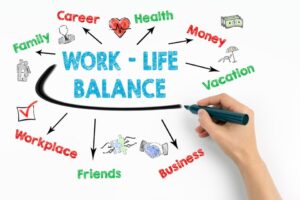One of the most sought-after goals for workers all over the world is to find a balance between work and home life. Modern jobs have a lot of demands, and people also want their personal lives to be satisfying. This can cause worry, burnout, and anger. It’s not enough to just manage your time to find a good work-life balance. You also need to manage your goals, energy, and attention in a way that lets you do well at work and in your personal life. Getting the right mix will make you more productive, improve your relationships, and make you feel better mentally.
Work-life balance is important because
Having a good mix between work and life is important for your health. A life that is mostly work can make you tired, hurt your mental health, and cause problems in your relationships. On the other hand, a personal life that is out of balance can make you feel guilty and like you don’t have any purpose in life. Finding balance, on the other hand, can help you do a better job at work, be happier with your job, and have more important personal moments. You’re more likely to be interested, focused, and happy in both your personal and professional life if you can find a balance.
Making it clear where work and personal life end
Setting clear limits between work and personal life is one of the most important things you can do to get a good work-life balance. This is very important in this day and age, when internet contact and working from home are often mixed together. Setting clear work hours and a strong choice to unplug after those hours is very important. You can mentally separate work from fun by not checking work emails when you’re not supposed to and turning off alerts. Setting limits for your body and mind helps you recover, which makes you more productive when you go back to work.
How to Manage Your Time: The Key to Balancing Your Needs
Time organisation is a very important part of staying balanced. You can make sure that both work and personal life get the attention they need by planning your time and setting priorities. To begin, divide your day into chunks of time and set aside specific times for work, personal interests, and self-care. Keep track of family events, meetings, and due dates with diaries, plans, or apps. Plan ahead and make sure you leave time for breaks and rest so you don’t feel too busy. Forget that organising your time isn’t about getting as many things done as you can. It’s about making sure the right things get done at the right time.
Putting self-care and health first
Self-care is an important part of balancing work and life that people often forget about. In order to be successful at work, many people give up their health, sleep, and well-being. This can cause stress and less work getting done. Make time for regular exercise, good food, and enough sleep to take care of yourself. Do things that make you happy, like reading, meditation, or spending time in nature, when you need to rest and unwind. Mindfulness techniques can help you deal with stress and improve your physical and mental health. This can help you focus and be more resilient at work.
How to Set Limits and Say “No”
Learning to say “no” is an important part of keeping a good work-life balance. A lot of people take on too many tasks, like work projects, social obligations, or family duties. Stress and thoughts of not being good enough can come from taking on too much. You should know your boundaries and be able to say “no” when you need to. Making a list of your business and personal goals will help you figure out what needs your attention and what doesn’t. You’re not being rude when you say “no.” You’re just protecting your time and energy, which is important for your long-term success and happiness.
Taking Breaks: How Rest and Recharge Can Help
Taking breaks throughout the day is important for staying focused and getting work done. When you work nonstop for hours on end, your mind can get tired, which can lower the quality of your work and make you feel more stressed. Plan to take a short break every hour to breathe deeply, stretch, or walk around. These breaks help you think more clearly and keep you from getting burned out. There are also longer breaks, like trips or personal days, that let you completely disconnect from work and recover. To be your best in both work and home life, you need to make sure your mind and body are rested.
Give and take on responsibilities
Another important part of handling work and life is learning how to give jobs to other people. Trying to do everything by yourself can quickly become too much, whether you’re at work or at home. At work, give jobs to other people that they can handle so that you can focus on more important projects. At home, split up the chores around the house with family or roommates. Asking for help when you need it not only makes your life easier, but it also builds teamwork and stronger ties.
Accepting that balance is fluid is part of being flexible.
Work-life balance isn’t the same for everyone, so it’s important to be open to new ideas. Work may take up more of your time some weeks, while family issues may need more of your care other weeks. Accept that things can change, and make changes to your plan as needed. You don’t have to feel bad about briefly shifting your focus if one part of your life needs more time. Being flexible lets you handle sudden events, like a family problem or an important work goal, while still keeping your balance.
Setting up a system of support
Getting and keeping a good work-life mix requires a lot of help from other people. Support from others, like a counsellor, coworker, friend, or family member, can help you get through tough times and reduce stress. Being honest with your boss about your personal needs and work load can also help create a setting that promotes balance. In your daily life, getting mental support from family and friends can help you stay grounded and keep your mind on what’s most important.
Using technology to make things easier
Even though technology can make it hard to tell the difference between work and personal life, it can also help you get things done faster. Software, tools, and apps can help you get work and personal chores done faster. Project management tools can help you keep track of work goals, and calendar apps can help you keep track of your own plans. Making things like food shopping and setting notes frees up time that can be used for self-care or spending with family and friends.
Getting ahead in your career and in your personal life
Finding a good work-life balance isn’t about being perfect; it’s about making choices that will help you do well in both your work and personal life. You can live a life that balances work and personal fulfilment by setting limits, putting self-care first, organising your time well, and getting help when you need it. Remember that finding balance is an ongoing process that needs to be tweaked all the time. But if you know what to do, you can succeed in every area of your life, including your career and your personal life.




